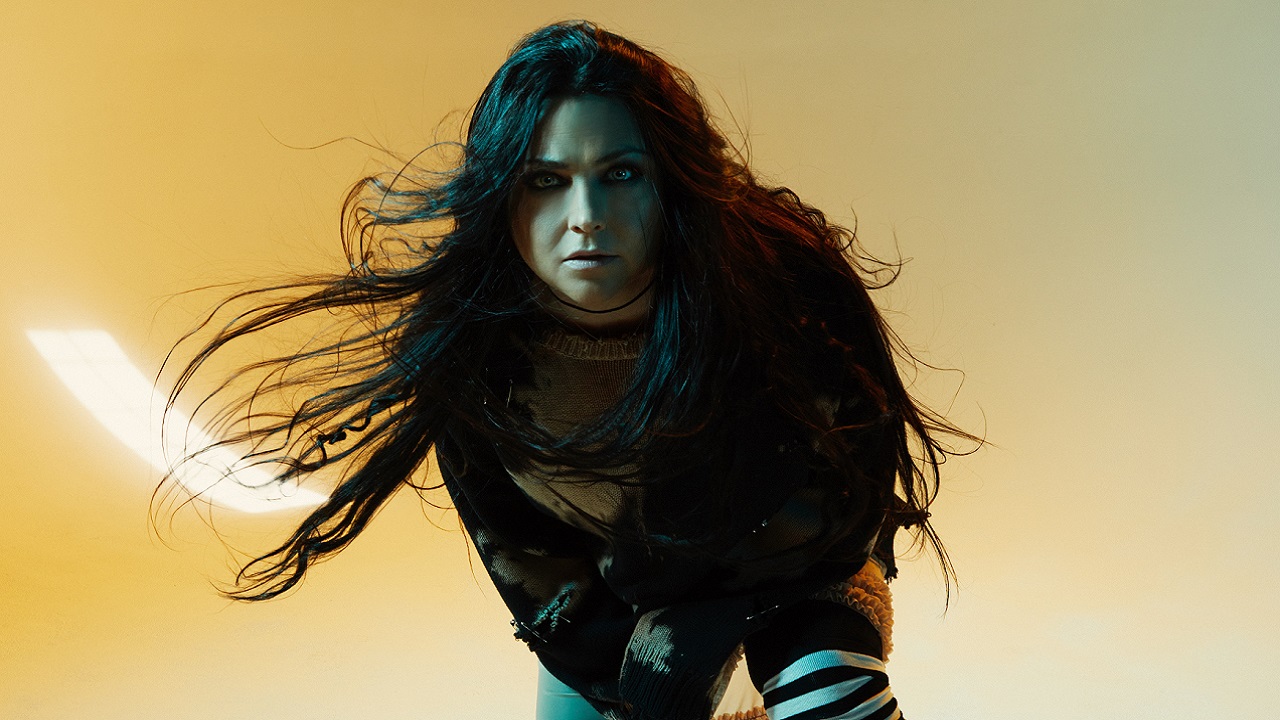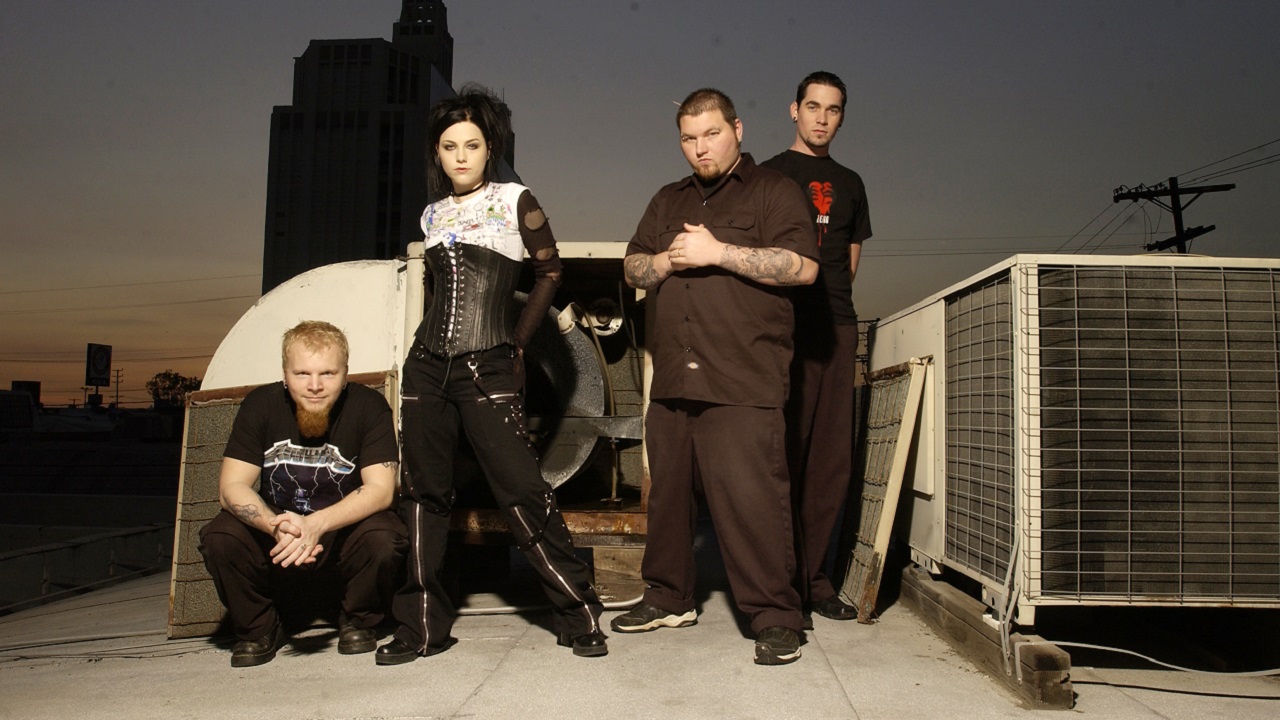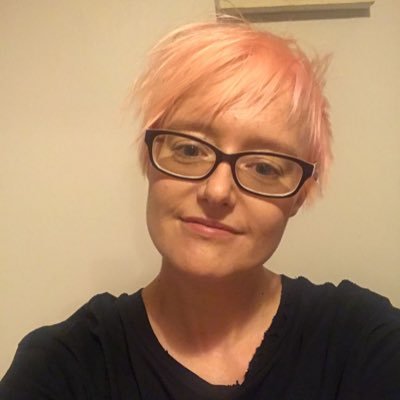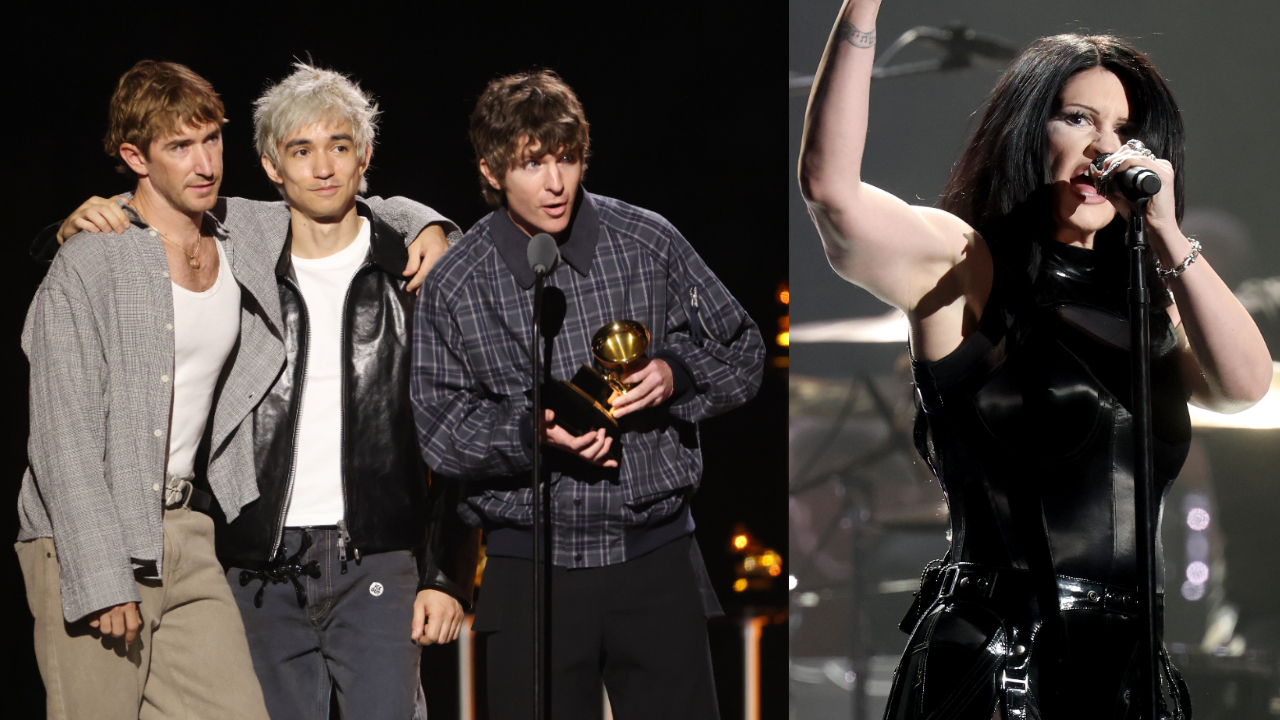Amy Lee: "It took a long time to get respect for being a creator and not just the 'pretty face'"
Evanescence's Amy Lee reflects on childhood tragedy, nu metal and 20 years of Evanescence

For Amy Lee, life was only ever going to go one of two ways. “My back-up plan was being Danny Elfman and my top plan was being a mega rock star superstar,” says Evanescence’s singer and prime mover with a laugh. Still, she adds, there was never any doubt in her mind one of those ambitions would eventually become a reality. “Manifesting is real!”
Now aged 41, the singer has achieved her dreams and more. Twenty years into her career, she’s a genuine icon, whose creative soul and steely self-confidence propelled her to superstardom when her band, Evanescence, broke through with 2003’s gothic juggernaut single, Bring Me To Life, at the height of the macho nu metal boom.
Evanescence’s 2003 debut album, Fallen, went on to sell a mind-boggling 17 million copies. Since then, the band she formed when she was only 13 years old in Little Rock, Arkansas has proved surprisingly resilient, releasing their fifth album, The Bitter Truth in 2021. In between, Amy has fulfilled her ambition of composing for a movie - her haunting work on sci-fi film Indigo Grey: The Passage won her a Moondance award for Best Score in 2015.
“When somebody tells me I can’t do something, I become super-intent on proving them wrong,” she explains today, as she prepares to look back over her life and career. “For every roadblock we hit – ‘you’re a female, you’re different, you don’t fit in a genre’ – instead of wanting to conform and make it easier for everybody, I felt those were our strengths. I didn’t want to blend in. I wanted to stand out.”
Stellar career aside, one of the reasons she’s talking to Metal Hammer today is because Tenacious D have requested her presence as part of their takeover of this issue. Handily, there’s a mutual love-in going on, and Amy guested with the band at last year’s Louder Than Life festival in Kentucky.
“Tenacious D are one of my favourite bands,” says Amy. “Their cable show [Tenacious D, which aired from 1997 – 2000 on HBO] was this awesome subculture underground thing that only a few of my friends knew about. Somebody had a piece of gear where they could record just the audio onto a cassette, and we’d listen to it in our cars. It’s been so cool to watch them not only survive, but thrive and be hilarious.”

How would you describe your upbringing?
Sign up below to get the latest from Metal Hammer, plus exclusive special offers, direct to your inbox!
“Wonderful, but also some hard times. I experienced tragedy at a young age [Amy’s younger sister, Bonnie, died from an unidentified illness when Amy was six years old]. I have an incredible family and parents that supported me, saw that I was into music at a young age and helped me pursue it. My dad was a radio DJ for 30 years, so we moved constantly. I’m kind of not from anywhere, just sort of lived in a lot of states.”
Where felt most like home for you?
“My earliest memories were in West Palm Beach, Florida. After all the moving, my family settled in Arkansas. So much of my life has been there, important times. But I lived in New York City longer than anywhere. I’ve never felt as at home as I have in New York. Whoever you are, you fit there, it seems. I was inspired by that.”
With your dad being a DJ, was there always music on in the house?
“A lot of classics; The Beatles, Neil Young and 60s and 70s rock… all these old records… old Motown stuff, Four Tops, The Temptations and Stevie Wonder.”
You started playing piano early. What made you fall in love with it?
“My mom could play the piano, and I remember being six or seven, sitting next to her as she sat down and was sight reading music. I started to cry, and she was like, ‘What’s wrong?’ And I was like, ‘I just want to be able to put my hands on the keys and play like that.’ And then they got me piano lessons. It’s something that I really, really love. It satisfies like a thirst. I’m still not a very good sight reader - that’s the math that’s the annoying part. I saw [Oscar-winning 1984 Mozart biopic] Amadeus when I was eight or nine and decided that’s what I wanted for my life. I wanted to be a composer, a genius composer. I was determined to train myself to be one.”
How did your sister’s death shape you?
“It made me look at the world in a different way, see it from a bigger perspective than the kids around me. I spent a lot of time being creative by myself because I was trying to express something that I couldn’t say. Whether it was poetry or music or drawing, I was trying to paint a picture of the inside and it has become my way through life.”
Was there a connection with what happened and you forming Evanescence when you were 13?
“Yes, for sure, it started this soul, spirit-searching, expression mode. The poetry, the music and the expression really kicked in in my early teens. All your feelings get stronger. Everything in your life, whether it’s the boy that you’ve liked for a whole week breaking up with you, or your bad haircut. Evanescence was born right out of that time.”
What was the first song you wrote for the band?
“It was during this grey area of not knowing if it was a band, because it was just me and the guitar player [Ben Moody, who left in 2003] making songs together in our parents’ houses. Some of our earliest songs actually made it onto Fallen, like Imaginary, Whisper and My Immortal.”
Do you remember Evanescence’s first gig?
“There was a cool venue that held about 100 people, a pizza place called Vino’s. The two of us would find musician friends from other bands in town, practise for the week and promise them pizza the night of the show. I was 16.”
You broke through with Bring Me To Life. Can you pinpoint the moment when you realised Evanescence had made it?
“It wasn’t a singular moment, it was like a snowball. [Our label] got us a placement in a big movie [Bring Me To Life was featured on the Daredevil soundtrack before its release] and that was when we knew we were going to have a real push. Then we started hearing Bring Me To Life on the radio, and it started moving up the charts. It went really fast from there.”
You were frustrated because your label forced you to add a rapper on Bring Me To Life…
“I was so scared in the beginning that we were going forward with something that wasn’t a perfectly honest picture of who we were. But it didn’t last long. After a few songs, the mainstream was able to hear more than the one song and it was like, ‘OK, they at least sort of get what we are.’”
What were the biggest challenges you faced early on?
“The fight for credibility was the most frustrating in the beginning. It was the mentality of labels to tell, especially newer artists, that they need to have writers. I fought for way too long after the success of Fallen to say I can write my own music. I constantly had to fight off men that were like, ‘No, you want me to do it? You want this guy to do it? You want my friend to do it?’ And the reason that they wanted them to do it was because that’s where the money was. That’s where the power was. Everybody else wanted to be able to say they did that when I did that. It took a long time to get respect for being a creator and not just the frontwoman, the pretty face standing in front of the guys doing the real work.”
Was the whirlwind success of those early days enjoyable?
“Some of it was surreal. Concerts went from clubs to arenas in a couple of months. There was a lot to be excited about, but there was a lot of hard stuff going on in the background. Not just drama about what we were doing, but also my brother [Robby, who died in 2018 following complications with epilepsy] was sick, and it was a scary time to be out on my own. And I did, in a lot of ways at that time, feel alone.”
In 2004, you won Grammy Awards for Best New Artist and Best Hard Rock Performance for Bring Me To Life. What do you remember about that?
“I was pretty sure that we weren’t going to win, at least not Best New Artist. I thought for sure that would be [rapper] 50 Cent. We were 100% the dark horse. I felt like, people don’t know who I am. I don’t do the whole thing. I’m a 21-, 22-year-old kid, trying to dress up like a grown-up and I had my shoes off when they called our name. I don’t normally wear heels. They’re very uncomfortable.”
You were given full creative control over your second album, 2006’s The Open Door. What did that entail?
“It was a beautiful time of independence for me. I was still learning who I was and still growing, and wanted the space to be able to try stuff. That was the time that I got really inspired by making homemade sounds. I grew up loving Nine Inch Nails, and so many of the sounds that I love that are in that music are a door slamming or a bunch of junk being dropped on the ground. I bought an old typewriter and made a loop out of it that turned into one of our songs, sampled one of my favourite Mozart pieces and put it in there.”
The Open Door’s lead single was Call Me When You’re Sober, which was written about your ex-partner, Seether vocalist Shaun Morgan. Was there drama when you released it?
“I feel like those things are as dramatic as you let them be. I give myself licence to say anything and everything in the music, as long as it’s honest. But it’s up to me how much detail I’m going to go into when I give an interview. I think the difference with Call Me When You’re Sober was it was kind of obvious. But I say brutally honest things in my lyrics. It’s only gotten more that way over time, and I always have to say, ‘Hey, you don’t ever have to totally break this down. It’s here, it’s in the lyrics. You don’t ever have to explain it beyond that.’ That gives me the freedom to be my whole self in the music.”

Were you disappointed when The Open Door didn’t sell as much as Fallen?
“That’s a tough one to answer. I try not to focus too much on the business. Of course, you always want it to be the best. Of course, I want it to always be No.1, but I don’t go into it for that. I focus on making something really great that I love, that our fans love.”
There’s been large gaps between Evanescence albums over the years. Did you never feel that modern pressure to be constantly visible?
“That pressure was always put to me from every angle, but I don’t operate that way. If you’re not authentic, then you’re not anything. You put all your energy into making something the best that you can and tour it - that takes a year or two. And then to immediately rush back in and start creating again, for me personally, that doesn’t work. I have to feel things and have something to say for the music to do what it does. Quality over quantity.”
Evanescence’s most recent album was 2021’s The Bitter Truth. What do you get out of the band these days?
“It’s an interesting question. We get to do something amazing. We get to travel the world, get up on stage and play our music for fans all over the place. We’re always trying to push it. From the second record on, I was never going to do the same thing again. Every time we’ve gone into making an album, that’s the goal. It’s got to be something worth saying. I want to say something new, something from the heart.”
What do you do to chill out away from music?
“I have an eight-and-a-half-year-old son named Jack, and he is awesome. Anytime that I’m not working, I’m hanging out with Jack, and we have a lot of fun together. His book reports have become our special event every year where we make a very elaborate film. He’s so fun, but he’s at the perfect age of wanting to create. We’re building a massive Lego Titanic. It’s taken months.”
Who’s your oldest friend outside the music industry?
“Beth Wilson is my hair and make-up artist and my best friend. I think we met when I was 17, and I was like, ‘Hey, they told me I’m allowed to bring somebody on tour to do my hair and make-up. Do you want to leave the salon and come on tour?’ That was in 2003. I think I’ve only played two shows without her. We’ve gotten to live this adventure together.”
What has been your career highlight?
“The thing I’ll I think about on my deathbed, when my life is flashing before my eyes, is that very special connection with people that we’ve been able to have with our music, what it does to people, what it’s done in my own heart and that experience we’ve been able to have together. There’s something beyond words, which is the thing that I was always yearning for as a kid, that music is able to express and it can connect people.”
What does The Bitter Truth say about who Evanescence are as a band now?
“It’s probably going to sound clichéd, but I think it’s the best thing we’ve ever done. If I didn’t feel that way, maybe we wouldn’t still be doing it. We started out really young, just a couple of kids trying to make stuff, and then it grew into something really real.”

Danniii Leivers writes for Classic Rock, Metal Hammer, Prog, The Guardian, NME, Alternative Press, Rock Sound, The Line Of Best Fit and more. She loves the 90s, and is happy where the sea is bluest.

